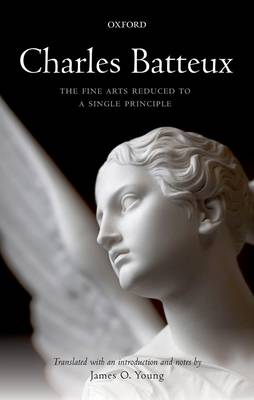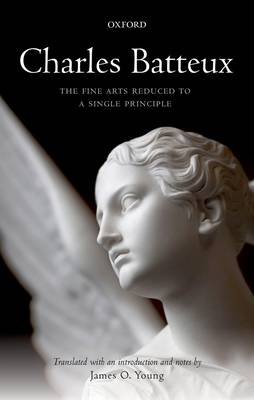
Bedankt voor het vertrouwen het afgelopen jaar! Om jou te bedanken bieden we GRATIS verzending (in België) aan op alles gedurende de hele maand januari.
- Afhalen na 1 uur in een winkel met voorraad
- In januari gratis thuislevering in België
- Ruim aanbod met 7 miljoen producten
Bedankt voor het vertrouwen het afgelopen jaar! Om jou te bedanken bieden we GRATIS verzending (in België) aan op alles gedurende de hele maand januari.
- Afhalen na 1 uur in een winkel met voorraad
- In januari gratis thuislevering in België
- Ruim aanbod met 7 miljoen producten
Zoeken
€ 157,95
+ 315 punten
Omschrijving
The Fine Arts Reduced to a Single Principle (1746) by Charles Batteux was arguably the most influential work on aesthetics published in the eighteenth century. It influenced every major aesthetician in the second half of the century: Diderot, Herder, Hume, Kant, Lessing, Mendelssohn, and
others either adopted his views or reacted against them. It is the work generally credited with establishing the modern system of the arts: poetry, painting, music, sculpture and dance. Batteux's book is also an invaluable aid to the interpretation of the arts of eighteenth century. And yet there
has never been a complete or reliable translation of The Fine Arts into English. Now James O. Young, a leading contemporary philosopher of art, has provided an eminently readable and accurate translation. It is fully annotated and comes with a comprehensive introduction that identifies the figures
who influenced Batteux and the writers who were, in turn, influenced by him. The introduction also discusses the ways in which The Fine Arts has continuing philosophical interest. In particular, Young demonstrates that Batteux's work is an important contribution to aesthetic cognitivism (the view
that works of art contribute importantly to knowledge) and that Batteux made a significant contribution to understanding the expressiveness of music. This book will be of interest to everyone interested in the arts of the eighteenth century, French studies, the history of European ideas, and
philosophy of art.
others either adopted his views or reacted against them. It is the work generally credited with establishing the modern system of the arts: poetry, painting, music, sculpture and dance. Batteux's book is also an invaluable aid to the interpretation of the arts of eighteenth century. And yet there
has never been a complete or reliable translation of The Fine Arts into English. Now James O. Young, a leading contemporary philosopher of art, has provided an eminently readable and accurate translation. It is fully annotated and comes with a comprehensive introduction that identifies the figures
who influenced Batteux and the writers who were, in turn, influenced by him. The introduction also discusses the ways in which The Fine Arts has continuing philosophical interest. In particular, Young demonstrates that Batteux's work is an important contribution to aesthetic cognitivism (the view
that works of art contribute importantly to knowledge) and that Batteux made a significant contribution to understanding the expressiveness of music. This book will be of interest to everyone interested in the arts of the eighteenth century, French studies, the history of European ideas, and
philosophy of art.
Specificaties
Betrokkenen
- Auteur(s):
- Vertaler(s):
- Uitgeverij:
Inhoud
- Aantal bladzijden:
- 232
- Taal:
- Engels
Eigenschappen
- Productcode (EAN):
- 9780198747116
- Verschijningsdatum:
- 1/12/2015
- Uitvoering:
- Hardcover
- Formaat:
- Genaaid
- Afmetingen:
- 142 mm x 218 mm
- Gewicht:
- 408 g

Alleen bij Standaard Boekhandel
+ 315 punten op je klantenkaart van Standaard Boekhandel
Beoordelingen
We publiceren alleen reviews die voldoen aan de voorwaarden voor reviews. Bekijk onze voorwaarden voor reviews.









